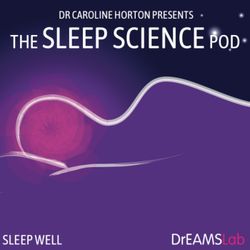Latest episode
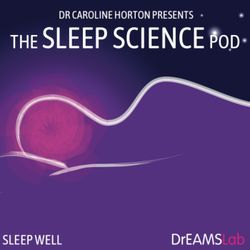
12. Ep12. Sleep, Dreams and Mental Health
35:16||Season 1, Ep. 12This episode considers some of the emotion processing and regulating functions of both sleep and dreaming. We consider some of the many aspects of mental health that sleep and dreaming are related to, such as depression, anxiety, PTSD and psychosis. We focus on nightmares as a manifestation of disordered emotion processing. Dr. Michelle Carr, researcher of dreams and nightmares, talks to us about how we may use our sleep-subjective experience for insight into our mental health, as well as how we might be able to engineer our dreams in the future. Dr. Carr’s Aeon magazine piece on nightmare re-scripting: https://aeon.co/essays/in-sleep-the-body-is-a-channel-to-communicate-with-the-dreaming-mind Follow Michelle on Twitter: https://twitter.com/darwinsdreams Follow Dr Caroline Horton at DrEAMSLabTwitter: https://twitter.com/sleepandmemory Subscribe to The Sleep Science Pod:https://podcasts.apple.com/gb/podcast/the-sleep-science-pod/id1550113366
More episodes
View all episodes
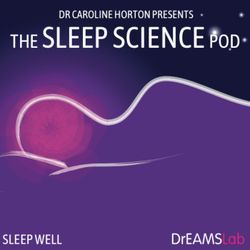
11. Ep11. Sleep Disorders
23:50||Season 1, Ep. 11This episode explores the most common kinds of sleep disorder and disruption, including, but not limited to, insomnia. We debate at what point normal troubled sleep becomes seriously problematic, and also consider how we might be able to deal with such disorders. https://www.sleepio.com/ - online CBTi programme to help assess and treat difficulties sleeping. Follow Dr Caroline Horton at DrEAMSLabTwitter: https://twitter.com/sleepandmemory Subscribe to The Sleep Science Pod:https://podcasts.apple.com/gb/podcast/the-sleep-science-pod/id1550113366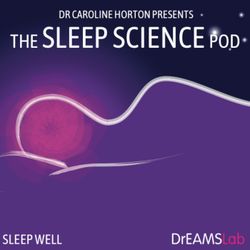
10. Ep10. Sleep in Children and Teens
26:41||Season 1, Ep. 10In the current episode we learn about sleep needs of infants up to young adults, which helps us to recognise how we can support them to sleep sufficiently.We recognise the challenges of limiting distractions for the ever-switched on toddler, and consider sleep phase delay in adolescents. In younger children, a regular routine is crucial, but in teenage years we learn of the need to be a little more flexible around their natural inclination to sleep later.We hear from College Principal David Vasse, who has implemented a later school start time, to facilitate the opportunity for teens to sleep a little longer.The Sleep Charity resource on teen’s sleep: https://thesleepcharity.org.uk/wp-content/uploads/The-Teen-Sleep-Hub-eBook.pdfBBC news item covering the demand from parents, scientists and educators to start school later: https://www.bbc.co.uk/news/education-47164545Follow Dr Caroline Horton at DrEAMSLabTwitter: https://twitter.com/sleepandmemorySubscribe to The Sleep Science Pod:https://podcasts.apple.com/gb/podcast/the-sleep-science-pod/id1550113366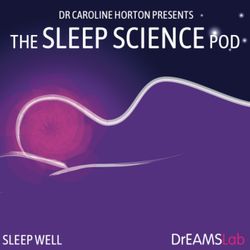
9. Ep9. How To Switch Off
27:58||Season 1, Ep. 9In this episode we explore the physiological and psychological mechanisms of “switching off”, by transitioning from alert wakefulness to sleep.Dr. John Shaw, sleep researcher and lecturer at De Montfort University, shares his experiences of sleep-difficulties and his diagnosis of ADHD, and we think about how we can optimise strategies and routines for helping to become sleep-ready.NHS information about ADHD: https://www.nhs.uk/conditions/attention-deficit-hyperactivity-disorder-adhd/Sleep Foundation information about ADHD:https://www.sleepfoundation.org/mental-health/adhd-and-sleepHow to build a sleep routine (for adults):https://www.sleepfoundation.org/sleep-hygiene/bedtime-routine-for-adultsFollow Dr Caroline Horton at DrEAMSLabTwitter: https://twitter.com/sleepandmemorySubscribe to The Sleep Science Pod:https://podcasts.apple.com/gb/podcast/the-sleep-science-pod/id1550113366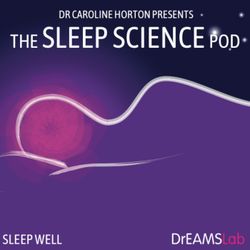
8. Ep8. What Happens When I Forget My Dreams?
26:48||Season 1, Ep. 8In this episode we acknowledge and explore why some people seem likely to remember many more dreams than others, both in terms of memory features and characteristics of dreams. Some dreams are simply more recallable than others, and some people are more likely to forget their dreams than remember them.Whilst we all seem comparably likely to function well in our waking lives whether we remember our dreams or not, we learn that we still need to sleep in order to have the opportunity to dream.Two guests this week, fellow psychologists Dr’s Alyson Blanchard and Tom Dunn from Bishop Grosseteste University, tell me about their sleep and dream recall patterns, and how they think they can make sense of them.Follow Dr Caroline Horton at DrEAMSLabTwitter: https://twitter.com/sleepandmemorySubscribe to The Sleep Science Pod:https://podcasts.apple.com/gb/podcast/the-sleep-science-pod/id1550113366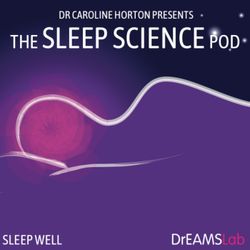
7. Ep7. Consciousness in Sleep and Dreams
27:06||Season 1, Ep. 7In this episode we consider how much we are aware of whilst dreaming, and how much we might be able to understand from our dream content, if anything at all!We explore how consciousness and cognition continue whilst asleep. Guest Soraya Kezelmann tells us about the Lockdown Dreams project, which aimed to analyse dream imagery collected over the course of the COVID19 pandemic, and we discuss how much we can interpret about people’s lives and emotions from their submitted dreams.We agree that dreaming is an important sleep function and may help us to process emotions from our waking lives, even if we don’t remember them when we wake up. https://www.lockdowndreams.com/For more information:https://www.theguardian.com/lifeandstyle/2020/apr/23/coronavirus-dreams-what-could-they-mean Science Focus: https://www.sciencefocus.com/news/sleep-in-quarantine-is-the-lockdown-affecting-our-dreams Follow Dr Caroline Horton at DrEAMSLabTwitter: https://twitter.com/sleepandmemorySubscribe to The Sleep Science Pod:https://podcasts.apple.com/gb/podcast/the-sleep-science-pod/id1550113366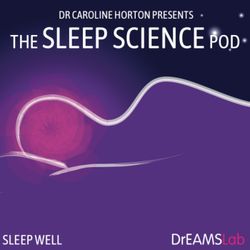
6. Ep6. Where Do My Dreams Come From?
12:09||Season 1, Ep. 6This week we consider the building blocks and sources of our dreams: our autobiographical memories, in other words, memories for our own personal experiences. We consider how dreams are organised from fragmentary elements of everyday waking life and re-combined to give dreams their characteristic emotionality and bizarreness.Caroline speaks again to Amy Brennan, who considers the sources of dreams from her own dream diary.International Association for the Study of Dreams https://www.asdreams.org/Amy Brennan’s blog: https://scribblejotteramy.wordpress.com/Follow Dr Caroline Horton at DrEAMSLabTwitter: https://twitter.com/sleepandmemorySubscribe to The Sleep Science Pod:https://podcasts.apple.com/gb/podcast/the-sleep-science-pod/id1550113366
